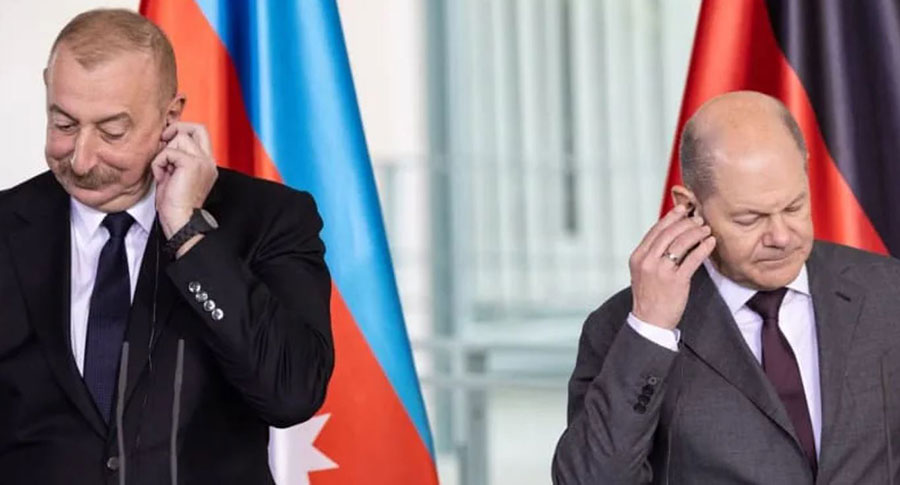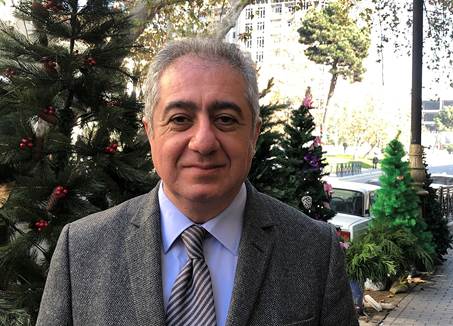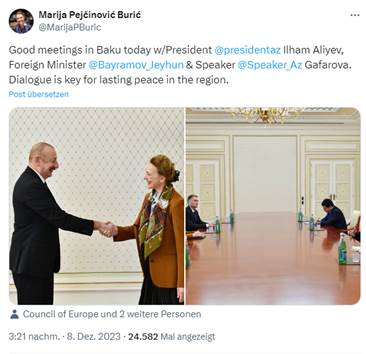26 April 2024
As Azerbaijani President Ilham Aliyev visits German Chancellor Olaf Scholz in Berlin today, it is crucial to address the stark realities of his oppressive regime and the ongoing human rights abuses in Azerbaijan. One forum to do so is the oldest club of European democracies, the Council of Europe, of which the country has been a member since 2001.
Aliyev, who has held power since 2003, has consistently employed tactics of repression against political dissent, freedom of expression, and civil liberties, drawing severe criticism from international human rights organizations. At the same time, he deplores discrimination and prejudice against Azerbaijan as causes of criticism, alleging bias and unjust treatment:
Read also
“Is it once again … some sort of game being played with us?! The Chancellor of Germany [Olaf Scholz] demonstrates impartiality … while a member of his party [Frank Schwabe] tries to get rid of Azerbaijan from the Council of Europe, get rid of one of the two non-Christian countries, and does it deliberately, openly.”
This is only meant to distract from the core issues of his rule, including the arrest and detention of journalists, activists, and opposition figures under abysmal conditions.
Key figures like Gubad Ibadoghlu, who has bravely exposed corruption and authoritarianism within Azerbaijan, face relentless persecution. Gubad’s detailed accounts of elite corruption and his subsequent imprisonment illustrate the regime’s intolerance towards transparency and democratic advocacy.
In July 2023, Gubad was arrested and charged with “manufacturing and selling counterfeit money.” The Ministry of Interior also accuses him of being involved in a terrorist organization. If convicted, he faces many years in prison. In detention, he was denied essential medication, despite suffering from heart disease, diabetes, and high blood pressure.
On 20 November 2023, journalist Ulvi is detained by masked police on his way to the airport. He is brought to the Baku General Police Department and beaten. Ulvi is the founder and director of the media outlet Abzas (“paragraph” in Azeri), known for investigative journalism exposing the corruption of authorities, including the Aliyev family, as well as corruption in the reconstruction of Nagorno-Karabakh. The media website has been targeted many times since 2016.
Mahammad, Ulvi’s deputy, is also arrested. Officers in civilian clothes pick him up from his house. His mother is not informed about his whereabouts for two days. Sevinj, the chief-editor of Abzas, is informed about Ulvi’s arrest while at Istanbul airport. She records a video there before boarding her plane back to Azerbaijan: “I couldn’t bear to live abroad, while Ulvi is in jail … I would rather die in Azerbaijan, instead of having a heart attack in Paris.” She is immediately arrested upon arrival in Baku.
The Council of Europe secretariat, under the leadership of Secretary General Marija Pejcinovic Buric, has hardly reacted to Azerbaijan’s crackdown on civil liberties. Despite the establishment of Human Rights Action Plans, the reality on the ground speaks to a continued disregard for fundamental freedoms, with the regime manipulating judicial systems to suppress dissent and maintain power.
The Secretary General largely ignores the fate of political prisoners. She ignores the darkness that has descended upon the few remaining independent journalists. She ignores the abysmal record of Azerbaijan when it comes to implementing ECtHR judgements. And she ignores the most basic question: is Azerbaijan still a democracy?
At the same time, members of the Parliamentary Assembly of the Council of Europe have been clear, detailed, and outspoken about horrendous violations of basic human rights:
“At least 18 journalists and media actors are currently in detention … Independence of the judiciary is still an issue of serious concern, as illustrated by numerous allegations concerning the existence of “political prisoners” … No tangible progress has been achieved on this issue … allegations of torture and ill-treatment by the police and other law enforcement agencies remain of major concern … Azerbaijan is one of the countries having the highest number of non-implemented Court judgments … From the above, it is clear that a number of outstanding serious concerns with regard to the rule of law, pluralist democracy and human rights remain unaddressed in Azerbaijan, as illustrated by numerous judgments of the European Court of Human Rights, opinions of the Venice Commission, Assembly’s resolutions and various credible reports … All this puts into question the country’s will to respect the basic principles enshrined in Article 3 of, and the Preamble to, the Statute of the Council of Europe as well as to honour obligations and commitments related to its membership in the Organisation … cast[ing] doubts as to the existence of a ‘genuine democracy’ and respect for the rule of law in Azerbaijan …” (23 January 2024, PACE Monitoring Committee, Mogens Jensen)
| Hannah (Bardell) | Rapporteur for safety of journalists in Azerbaijan | |
| Sunna (Aevarsdottir) | Rapporteur for political prisoners | |
| Lise (Christoffersen) | Rapporteur for monitoring Azerbaijan | |
| Kostis (Constantinos Efstathiou) | Rapporteur for torture / ECHR judgements | |
| Mogens (Jensen) | Rapporteur for media freedom | |
| Frank (Schwabe) | Group Leader, Socialists, Democrats and Greens |
Today’s meeting in Berlin must not just serve as a diplomatic formality but as a platform to confront the serious human rights violations occurring in Azerbaijan. It is imperative for the international community, including Germany, to take a strong stand against Aliyev’s repressive tactics and push for substantive democratic reforms in Azerbaijan. The plight of Azerbaijani citizens under Aliyev’s rule cannot be overshadowed by geopolitical and economic interests.
Heeding the lessons of past failings regarding Putin’s Russia in the Council of Europe, the Council of Europe’s Committee of Ministers must break its silence with a simple strong message, both to Azerbaijan and to all member states: There can be no political prisoners in any Council of Europe member state. Germany should push for the Committee of Ministers in Strasbourg in the next weeks to embrace this position:
Both PACE and the Committee of Ministers want Azerbaijan to remain a member of the Council of Europe. However, to remain a member Azerbaijan must release its political prisoners now. If it does so, PACE will restore the credentials of the Azerbaijani delegation. If it does not do so, the Committee of Ministers will follow the lead of PACE and suspend Azerbaijan’s membership, based on Article 8 of the statutes, before August 2024.
Gerald Knaus




























































